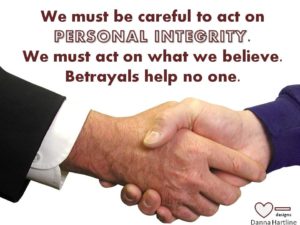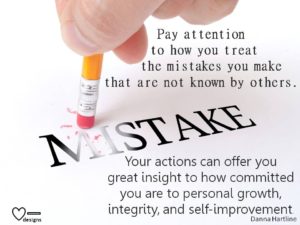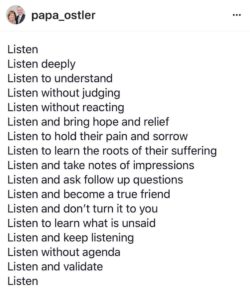
If I Were a Bishop
Recently I was contacted by a former stake and mission president, David Ostler. This wonderful man is dedicated to helping leaders learn how to help members through faith crisis. He has an impressive website dedicated to just this cause called Stake and Ward Resources. It is definitely worth checking out.
Dave emailed me because he knew of my work and interest in helping trauma victims. He wanted to ask some urgent questions he had in regards to leadership. He asked, “If you were a Bishop what would you do differently in your ward? What would you do differently in sacrament meeting, Sunday school and 3rd hour? What would you do with the youth?”
My mind flooded with thoughts. But rather than simply sharing my own ideas, I decided to ask these questions to a wonderful bunch of people: an LDS church trauma support group. They had much to say. Some of their ideas are contradictory with each other because they come from experiences of different people. But I hope leaders will open their hearts to the voices of those who have been hurt and are seeking healing because they have some wise suggestions of ways leaders can help them find safety once again in the very location they are/were struggling:
- Create an environment of safety. This is the most important thing that needs to happen. As I have struggled with my own faith crisis I have not felt comfortable in approaching either my bishop or SP out of fear of being treated like an apostate. I do not know how this can happen but it is the thing that has made this trial the most difficult. It is hard to find anyone who is not currently struggling with their faith to help me through this.

- Call a special advocate or community resource person to help get ward members in touch with community resources in their area that can help in situations with abuse, trauma, etc.
- Encourage each auxiliary to give lessons on a variety of topics which assist, address, and inform of the effects of trauma, importance of empathy, emotional intelligence, spiritual abuse, consent, coercion, healthy coping mechanisms, how to be a safe person for when someone reaches out, and ethical handling of abuse.
- Never be alone with children and request a spouse is there for meetings.
- If someone is undergoing abuse etc, make sure they are able to see someone professionally.
- Make sure every stake has a disability specialist and ensure that everyone is included. If there is bullying occurring, make sure that the victims are safe at church.
- Take all allegations of abuse seriously and report to the proper authority.
- Give women callings that men typically hold, but don’t have to. Place women as leaders on the stand in every meeting.
- Stop any teachings on virtue=virginity and masturbation=sin next to murder. Change purity culture by stopping dress code scrutiny of girls and instead apply it in a healthy manner to all genders.
- If someone came to me with a faith crisis, homosexual desires, or transgender issues, we would have a beautiful discussion about the pros and cons of staying in or leaving the church. Leaving would be considered a deeply viable option and loving discussions about how to move forward would ensue. No one would ever be asked about masturbation habits. Disciplinary councils would only be held when mandatory and they would be exceptionally gentle unless there was a need to protect others from being hurt or abused by the person. Talks would focus heavily on Christ and becoming doers of the word and not just hearers. Modesty wouldn’t be discussed. All reports of emotional, sexual or physical abuse would be handled with great care and the victim would be believed. Most of the more difficult member struggles would be referred to a qualified counselor.
- The word disciplinary sucks! It’s scary, sounds very punishing, exacerbate shame, etc. Eliminate them! Start listening, encouraging, coaching, provide unconditional acceptance. It’s okay to have some social consequences (e.g., can’t use priesthood) but never shame people into a category such as excommunicated.

- First of all, get rid of that 3rd hour of Mormon worship!
- People’s attention span has lessened. That 3rd hour can be tortuous. Make sure sacrament is done in an hour max, then 35 min for SS and 35 min for RS. That would make things more bearable.
- 3rd hour, as with all LDS gendered ordinances is where the church goes out of its way to slap trans people in the face. Not by what is discussed, but by where they are even allowed to be. The bathrooms, the church records of legal name and gender are even battlefields. We are not getting into policy like church courts…so I have limited it to a few things. The female subjugation to priesthood with no excuse except traditions of the father who says that God has not conveniently told them anything different. For the youth, maybe start by defying the policy to treat children of gays how policy asks. And then expect to not be a bishop much longer.
- If the bishop is not a licensed counselor, stop pretending to be one. Working with licensed counselors in your community, try to create a referral list.
- Stress all confidentiality. SP and Bishops divulge too much info on people to Relief Society president and Elder’s Quorum and those people tell other people they trust and then everyone quietly knows about it. Sometimes it’s not even facts but opinions and the rumors start. Also, they need to be reminded that just because they might be in the medical field, does not give them the right to go to church and tell people which other members are in the hospital or sick. If the patient wants the whole congregation to know his business he would go through the ward list and notify everyone. In short, apply common sense.

- “Every star is different, and so is every child. Some are bright and happy, and some are meek and mild. Everyone is needed; For just what he can do. You’re the only person. Whoever can be you.” – – Dear Bishop X – The youth are not bred to be junior salespeople for the Mormon corporation. They need to know the dozens of options open to them post high school, including not being a missionary or housewife/mother. If they choose to go to a university or military or trade school or volunteer abroad or whatever…. Don’t condemn them for it. A successful, happy person speaks volumes more than someone who never experienced true mentoring and freedom (aka free agency).
- Teach members to never give up on themselves–to never feel like they are insufficient or it’s too late if they “fell down” or fell short. Encourage them to watch this video of W. Mitchell: https://www.youtube.com/watch?v=NdQ61ASj0mY. Also, using the mindset of Mitchell (personal freedom, responsibility), personally identify at least two issues in your respective role as bishop that needs improvement. Describe each problem/situation then work toward improvement. Putting on the “glasses” (paradigm, mindset) of Mitchell (perhaps removing an old pair of “glasses”); explain how you will become part of the solution to the two problems you identified using this mindset of service (love).
- Stop the mandatory dress code. There are people who do not come to Mormon church because they don’t want to get dressed up. Other churches noticed this decades ago; your worth is not wrapped around how conforming you are in your clothing. What a radical ward you’d have if on 5th Sunday people could come in weekday clothes, i.e. jeans, shorts, etc. – including YOU, bishop. Then… 3rd hour could be that people bring a sack lunch and have 10 different groups set up outside or in and simply talk about not Mormon things. The downside of internet is isolation and I believe people are craving non-judgmental discussions away from the superficial.
- Well, my bishop helps me when it comes to certain topic that my partner and I can’t handle due our trauma. He will have the teacher talk about something else so we both don’t have triggers.
- Set up a class similar to DivorceCare because divorce is becoming more and more common in the church.
- New bishops should go through training to let them know that when a spouse leaves Mormonism, they shouldn’t rally around the active member, taking sides and accelerating the divorce to sometimes cruel levels.
- I think that without changing the underlying mentality, there is nothing that you can really do to change the dynamics of the church so my focus in suggesting changes would be in the direction of things they could do that would help change their perspective. I would say things like find common ground with struggling members and stay there until the other person signals they want to move forward.
- Help the leaders facilitate more open discussion in classes, teach them not to be afraid of alternative opinions and how to react to them in ways that is non-threatening.
- Teach leaders to focus on the underlying issues causing member’s issues rather than on their behavior, etc.
- Counsel with leaders rather than telling them the answers. As a stake president, if he learned to counsel rather than dictate with the bishops, and they learned to do that with the ward leaders, it would trickle on down the line.
- I’d like to see a Bishop and his counselors, including the other leaders, moving among the congregation before Sacrament meeting shaking hands and getting to know the ward members. To me, there’s an elitist business atmosphere among the priesthood and auxiliary leaders that isolates them from the ordinary ward members not directly involved in their stewardships. There’s a social stratification that turns what should be friendships into “church-ships.”
- I would change the sacrament to follow the agape feast of the first Christians. At least eat bread and wine/water to your fill.
- I would have a moment where we greet one another with a holy kiss/hand shake.
- Songs would be sung faster and with joy or thanksgiving. No more dirges!
- I would insure widows, orphans and the poor would be taken care of. By visiting them, having Elder’s Quorum visit with the sacrament and having the RS show up with food order in hand. People should not be left feeling like they are beggars.
- Human sexuality, for 12 year-olds and up, would be addressed at firesides with parents and guardians present.
- Addictions would be addressed in a similar manner as sexuality.
- I would open the Ward once a week for AA or other addiction programs.
- LGBT community would be welcome and provided the sacrament, unless they don’t want to partake.
- Stop meeting with children. Group teaching is okay not classroom. Doors should never be closed with children. Not appropriate.
- Determine what is a confession vs. counseling and send people to therapy. Bishops should never ever ever give advice.
- Stop ministering to inactive members. They know where you are and will go to church if they want to.
- Allow people to question. Don’t shame people for asking questions. Support everyone and their views. Ask questions with curiosity to understand not judgment.
- Stop shaking hands. It’s so weird and creepy. Respect people’s bodies and space.
- I’d tell the truth about the church, which means I be released quickly.

- Fly free.
- Be kind.
- When you know better do better.
- REALLY love and accept EVERYONE.
- Show kindness and sincere interest in people.
- Less meetings.
- More social time.
- Stop being hung up on authority.
- Start singing music not found in hymnals.
- Encourage open discussion.
- Teach out of ALL good books.
- Learn about other religions and cultures.
- Be up front about the history of the church and its beginnings.
- Start support groups that cater to real needs and offer professionals to lead meetings.
- Stop “presiding” over women’s organizations. . .or women/girls EVER.
- Choose one of the gospel topic essays and study it for an entire month in Sunday school. Make sure all members are taught and openly discussing this essays.
- Provide classes and discussions for single parents without so much emphasis on the proclamation as the only family that counts.
- I would make recognizing and addressing abuse/bullying just as important in the culture as is placed on the law of chastity and word of wisdom. Bullying is more damaging and is proven to lead to more problems than the other two.
- Encourage MORE of Christ’s teachings and less “Mormon” talk. Talk about how members can be closer to Christ in a more personal way. I want more emphasis on Christ, his atonement and not so much on church history, policy, leaders, etc.

- Answer questions as honestly as possible and don’t shun those who ask questions. And please stop all the repetitive classes. What would happen if you asked members what their views on being a true Christian as opposed to being a good Mormon are?
- Everything taught in 2nd hour is just glossed over because there is too much in any book to cover in a year. Have a schedule that allows real study of the scriptures, especially the Bible.
- Don’t make people “projects.” Just because someone isn’t living like Molly/Peter doesn’t mean they need or want the bishop and RS pres in their home every month. Meeting others in the ward and feeling truly loved instead of “I’m supposed to tell you that I love everyone” would be much more beneficial.
- No sex discussions with youth.
- Believe victims of abuse and refer them to appropriate counseling.
- Do not choose sides in conflicts in the ward.
- Do not expect the poor to pay tithes/offerings. You should not have to buy your way into the temple…the poor need the blessings of the temple too.
- Help people to find their own soul; stop guilt-tripping for not going with the system (e.g., mission). Encourage self-trust, personal vision, listening to conscience, not social norms.
This list may feel overwhelming and controversial. Some suggestions are even contradictory to what leaders should/could do. The bottom line, I think, is that we cannot please everyone. But we can be sensitive to people. We can seek to be aware of needs and concerns. We can listen and consider with an open mind. We can apologize when we make a mistake. We can do all in our power to right our wrongs when we become aware of them. I think this is called love. And to me, that’s why true love needs to come first and foremost for one who is seeking to be a representative of Christ. One who is a true conduit for Him is one who seeks to put love first. Statuses, opinions, and circumstances should not be conditional on loving our fellowmen. Love is a great healer, a purifier, an anchor. When we offer it, tears and fears can be replaced with gratitude, acceptance, safety, and camaraderie as we see our common thread, our common need, our common Rescuer and Redeemer. Love is the means and love must be the end!
In the era of ministering, we need to understand that love means meeting people where they are rather than trying to overly emphasize membership status and church activity. Helping them with their real needs, whatever they are, rather than worrying about what they do on Sunday is the mark of true Christian service.
Here are three other articles that might be helpful to leaders as well:
Conflict During LDS Church Lessons–Does It Belong?
How Can the LDS Church Become a Hospital to the Traumatized?
Oh, No! I’m Having a Major Crisis!
 **Danna is the creator of The Mormon Trauma Mama. She is actively involved in advocating for those suffering from church trauma and is currently getting her Master’s degree in Pastoral Counseling from California Southern University. She and her husband have four delightful children. For more information on church trauma, watch this presentation.
**Danna is the creator of The Mormon Trauma Mama. She is actively involved in advocating for those suffering from church trauma and is currently getting her Master’s degree in Pastoral Counseling from California Southern University. She and her husband have four delightful children. For more information on church trauma, watch this presentation.



